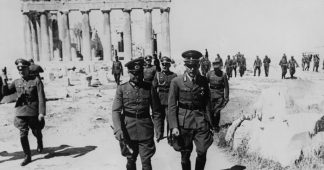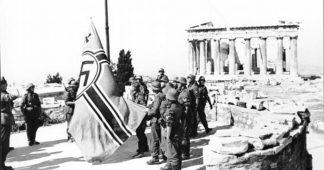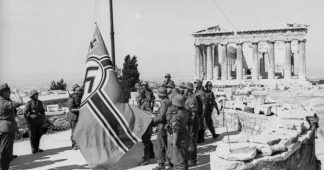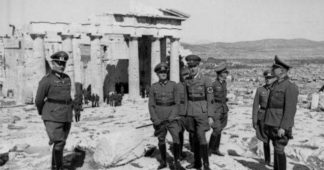World War II obligations to Greece
By Jeffrey Levett
16 May 2020,
On 1 September 1939, German forces invaded Poland; Britain and France entered the war with a mission to save the world from fascism. An awful, devastating struggle against fascism unfolded. Nazi Germany must be defeated. With America’s entry into the war, with Britain, France and the great struggle of the Soviet Union, the Allies came through victorious. Germany was defeated but at terrible cost and to the German people and all Europeans. War ended in Europe on the 8th May 1945. Known as a great deliverance it did not end fascism.
As the three of us chat I have to say that our geopolitical perspectives and personal experiences of World War II (WWII, 1939-1945) are distinctly different. Yours, Vassilis, is as a child messenger of the National Resistance in Occupied Greece, the sabotage of a German telephone line connecting the command center with the troops and participation in founding the first high-school student community (1944, Phanari, Karditsa) aiming to support the resistance against Nazi Germany. Yours, Aristomenis, is through the dreadful suffering of your family during and after the Holocaust (massacre) of Viannos, Crete, committed by Wehrmacht troops in September 1943. On your family’s door there were 5 black crosses that indicated a loss of 5 members executed on 14.9.1943.
During the German Occupation such massacres were frequent and happened throughout Greece. As British troops entered Greece in 1944 they witnessed the cold, beyond denial evidence of German cruelty, wanton killing and colossal Greek suffering. The German crime was murder and documented by Life and the photography of Dmitri Kessel. In Sacrifices of Greece in WWII Doxiardis says that the aim of the Axis was to destroy Hellenism, which always stood up against the forces of violence. While the Greek population also died from cold the Germans chopped down trees and sent wood to Germany and Bulgaria and used it for their own heating. Forests were depleted overall by 25% and in Attica 75%. Your point of reference Jeff comes from childhood in northern England.
What was it like for you?
Yes England! But first let me add that children in Athens starved while currants rotted in the country side as a result of the partitioning of the country by the invader. Sacrifices was based on the work of Nikos Kazantzakis Professor Ioannis Kakrides and Professor Ioannis Kalitsounakis in the summer of 1945 with photographer Kostas Koutoulakis who trudged the length and breadth of Crete gathering information and presented during the Paris Reparations Conference 1945-1946. Jeff, according to the Paris Agreement, Greece should have taken as Reparations 7.181 billion US dollars or 108 billion euros (2010), excluding interest. If we add the loan that Greece was forced to provide to Nazi Germany during the occupation, the amount owed by the Federal Republic of Germany to Greece currently reaches 162 billion euros, excluding interest. However, this amount does not include either compensation for Greek victims of Nazi atrocities or the value of stolen archeological treasures. If we add 3.5 billion US dollars for the forced loan on Greece or 162 billion euros.
Yes I was in the West Riding of Yorkshire; agriculture, coal mining, steel production and the country’s largest Labour stronghold. My first fuzzy memories; Dunkirk, the Battle of Britain, Air Raid Shelters, pending invasion and food shortage, then solidifying images and as a result of repeated hearing; blackout, child evacuees, powdered egg from Canada and the voice of Churchill and then my personal emergent recollections; the Normandy landings, VE Day (Victory in Europe) and bonfires, the Atomic Bomb, then VJ Day and food rationing. How unifying it was then; there will always be an England and England shall be free. Post war, seen first through the London fog, a newspaper photo, dull black and white showing the back of the Goalie of Moscow Dynamos. He is looking out for the ball from his net through pea soup. The Green Un on a Saturday evening with all the soccer results. Friday afternoon a Mars bar. And the messages never give up, never despair. I recall the startup of the NHS. Better housing, nationalization of coal. A scholarship from the West Riding made a difference. Still today, whenever a siren sounds I feel something like apprehension.
Today, 27th April 2020 is a black anniversary. It is 79 years since the start of the brutal German occupation of Greece. A little time before the Allies registered their first victory with Greece’s defeat of Mussolini. My co-discussants are Vassilis Brakatsoulas, member of the Resistance, lawyer, author of 26 books (most of them best-sellers), former member of Parliament (elected 5 times), co-chair of the National Council for the Claim of Germany’s War obligations to Greece and Aristomenis Syngelakis, dentist, political scientist, with a PhD in Dental Public Health, Co-Secretary General, National Council for the Claim of Germany’s War obligations to Greece.
Mr Vassilis Brakatsoulas, Vassilis, what captures my eye is your great knowledge of Greek philosophy but first a few personal words from your rich memory. What would you like to say about Manolis Glezos?
I was 10 when World War II (WWII) broke out in Europe; in Greece I luckily escaped death from bombing together with my family. I joined the National Resistance in my early teens carrying documents, information, medicines, and food from valley to mountain and from rural areas into the city of Karditsa. I never carried a weapon but recall a sense of always being on alert. Manolis was a wonderful man, an honest and trusted friend, an inspired and inspirational leader, a talented writer, an excellent family man, a father and a grandfather. He was a leader. Manolis was angry but not disappointed by the German State’s intransigence and insensitivity. Until the last days of his life he fought and insisted on concluding a Peace Treaty with Germany as the key to the repayment of German obligations to Greece!
Philosophy?
I came to know better the wisdom of ancient Greek philosophers during the years of my exile ordered by Dictatorship 1967-1974. I got to know the essence of the sophistry and Plato’s conflict over democracy and human rights, Aristotle’s political, legal and moral thought, Socrates as a citizen of the world and the spiritual contribution of Greek Antiquity in Education, Fine Arts and Culture. It is a means that if used could be helpful to government today. Don’t ask me how!
Dr. Syngelakis, Aristomenis what would you like to say by way of introduction?
Manolis Glezos is a timeless leader in the struggle for remembrance and Justice. As long as I can remember, over the 18 years that I had the privilege to know him, Manolis Glezos, our beloved President, was present in all remembrances and manifestations on each black anniversary of the entry of German forces into Athens (27 April, 1941). Unfortunately, we lost him recently and this year it takes place without him and to a background of a pandemic. Manolis Glezos was the embodiment of Resistance and the spirit of the Greek people against tyranny. Manolis Glezos was always at the forefront of the struggle for the justification of the heroic Resistance and for recognition of the sacrifice of the Greek people. By the way, I would like to congratulate you Jeff on becoming an International Peace Prize Laureate and highlight an important fragment during your acceptance of the award; we have to wonder which system will collapse next, one you cited was damage to, health from a global pandemic. It seems now that COVID-19 was festering then, when you were in Asia (November 2019). Compared to the rest of the world the Greek NHS held up, it did not collapse! Thank you. In the global chaos of the Coronavirus, Greece has mounted an effective response but care is still needed in the relaxation process. However, we should note the global failure to invest in health care systems to meet the needs of citizens. Let me also pay tribute to the late Mr. Glezos by saying: World War II (WWII) was the most tragic episode in humanity’s recorded history. In my embryonic examinations of social dementia and the shame of the civilized world I pointed to its greatest abomination, the death camps in central and Eastern Europe, Nazi policy instruments for mass killing of their Jewish, Slav and Roma populations and the massacres and executions of civilian populations by the forces of the third Reich, in Greece and in Serbia. WWII was a case of power lust, appeasement and profits from the sale of arms; its death toll was 220 Poles per thousand of the population, 116, USSR; 15, France; 8, UK; 7, Belgium and 3, USA. I can never shake the thought that British soldiers were killed with bullets made in Manchester.
Aristomenis give us the devastating figures for Greece as you know them.
As you said in Crete, Jeff, Hitler never expected such stiff resistance to the German forces. Nazi Occupation was a time of terror and death. Human loss in Greece was about 14% of the population, a loss of 137 per 1000 in three years by execution squads, in the concentration camps of the 3rd Reich and by the low birth rate as well as by enforced famine. In Athens approximately 100,000 died within the winter, 1941-42. The Greek economy contracted considerably. It has been estimated as more than that suffered by America in the Great Depression.
Vassilis, Aristomenis, you are men on a similar mission but from different generations. A couple of years ago I was your guest on Crete for a celebration of respectful remembrance of the victims of outrageous cruelty in German occupied Greece. What I saw were strong sentiments of forgiveness and great solidarity with the German people but no forgetting of Nazi atrocities. I don’t know when, or how or where this story will end but my experiences then, said that the ongoing and unrelenting struggle for justice and recompense, not revenge, will one day win out. I was privileged to participate in an exceptional Congress which took place in the Museum of the Holocaust, Viannos, 70 kilometers from Knossos. It was a moving tribute to the victims of unbelievable Nazi atrocities in Viannos and the surrounding villages in September 1943.
You Jeff addressed the health impact of the occupation and focused on the enforced famine in Athens (1941-1942). The loss to Greece between invasion and retreat have been estimated and in Germany. We emphasize that our struggle is to claim the as yet unsettled and fully substantiated claims of Greece on Germany. The enormous human loss, bigger than any other country worldwide, which included members of my family were not the only consequences of the Occupation.
Now Greece, together with the rest of the world is dealing with the devastating pandemic of Coronavirus. Manolis Glezos just passed away. Your Comments?
On the issue of the coronavirus, the relative success of Greece lies in its vigilance having observed the worsening plight of our badly hit neighbor Italy as the pandemic’s epicenter passed from Asia to Europe. The temporary emergency measures imposed to protect the population by the authorities were proportional and the work of the expert team set up in the Ministry of Health and the dedication of the country’s health personnel gave us something to be proud of. And let’s not forget the adherence to restrictions imposed by lockdown by our people.
My fellow discussants let me say that the COVID-19 pandemic should be a unifying force as demonstrated in other catastrophes including WWII. It is not! Instead a divided world becomes more divided as growing inequality undermines global stability and a weakening of America and China can cause a return to nationalism and fascism. 8 May, 2020 is also the 40th anniversary since the eradication of smallpox, which historically took the lives of hundreds of millions. In contrast to COVID, humanity’s victory over smallpox is a reminder of what’s possible when nations come together to fight a common health threat (Dr. Tedros Adhanom Ghebreyesus, WHO Director-General). Aristomenis?
Now the government must support people affected by the COVID pandemic. Already, even from that most unlucky day of the invader’s entry into Athens, the spirit of “Adouloti Hellas” manifested itself, meaning the Greek rejection of enslavement and servant status. As the radio announcer Costas Stavropoulos put it in the last historic announcement on April 27, 1941: The invader enters a deserted city with its houses all closed. Brothers, keep the spirit of the front in your hearts and soul. Our war continues and will continue until the final victory. Long live the Greek Nation. Adouloti Hellas is well expressed by Yiannis Ritsos, “I see that our people kneel only before their dead”.
What followed?
This was followed by the sacrifice of Mathios Potagas, a student outside of Vytina in the Peloponnese who tried to block the advancing German troops and was brutally murdered. Then came the Battle of Crete and the strong civilian resistance to the invader; this is the most important innovation of WWII; A People’s Resistance. The removal of the swastika from the Acropolis by Lakis Santas and Manolis Glezos and several other acts were considered personal insults by Hitler. Glory of our people, the epic of the National Resistance, with the universality in time, in space, in the participation of the people, in the forms of struggle as Manolis Glezos has written in his excellent book for the National Ressistance in Greece.
Aristomenis you refer to Manolis Glezos as our beloved president, I believe he stepped down a few years ago? Vassilis?
Manolis stepped down four years ago to make space for younger contributors to the struggle. He always wanted to create an even better synthesis of generations: from the Resistance generation to younger generations in order for our mission to maintain momentum. He wanted even more young people to enter and take over. We can say that our movement hosts different political ideologies and professional backgrounds, women and students and bridges generations.
His gesture paid dividends; And your current mission?
Our mission started not today but 75 years earlier and remains unchanged. The Occupation Report for Greece was more than dramatic: hundreds of thousands of people died from starvation, diseases, executions, displacement, forced labor, torture and the Jewish Community in Greece was almost wiped out. Our country was the only European country, which suffered a decrease in its population. One thousand seven hundred and seventy villages and more than four hundred thousand houses were torched to the ground (25% of the total). The productive and social infrastructures of our country were completely destroyed; its resources were methodically looted. In addition, archeological and cultural treasures of incalculable value were stolen and sent to the Third Reich. Monuments of unique value were severely damaged. Our country has suffered an unspeakable tragedy and at the same time an unprecedented economic catastrophe, which has brutally undermined its development perspective for decades.
This year is the 79th black anniversary the first without your President.
Manolis was the embodiment of the resistance spirit of our people, the fighting memory of the Greek nation and a supporter of the struggles for freedom of all peoples. While he is not present, his spirit is still alive and with us. Manolis always referred to his combatants in the resistance, vowing to continue the struggle in the name of all those who were executed, tortured, killed by the Nazis, and to continue their struggle and the fight for the justification of the unique Resistance and the incredible sacrifice of our people. So we honor him today, his memory, and the struggles of the National Resistance. In his name, we undertake a sacred commitment to continue the struggle until the final justification and restoration of the crimes against the Greek people during the barbaric Nazi occupation find their rightful place in history.
And yet?
Seventy-five years after the end of World War II and thirty years after the reunification of Germany, the Federal Republic of Germany (FRG) continues to refuse to take practical responsibility for the heinous crimes of Nazi Germany and continues to scandalously violate its obligations towards History and International Law. It has taken advantage of the fact that Greek governments, over time, have not claimed restitution with the required strength, method and determination of the fair and well-documented debt of the FRG to Greece. We call on the German government to show its remorse for the destruction of Greece committed by the Third Reich, participate in negotiations with the Greek government to resolve the overall issue of German War obligations to Greece (return of stolen cultural property and the forced occupation loan, payment of reparations for the destruction and looting of the country and compensation to the families of the victims). We call on the German government not to forget that the Greek people suffered unbearably. With their Resistance and with their sacrifice they offered their best in the struggle to overthrow Nazism and fascism and liberation of Germany itself from the Hitlerite yoke. We also call on it to conclude the International Peace Treaty with Greece.
Continue readinf at wsimag.com











